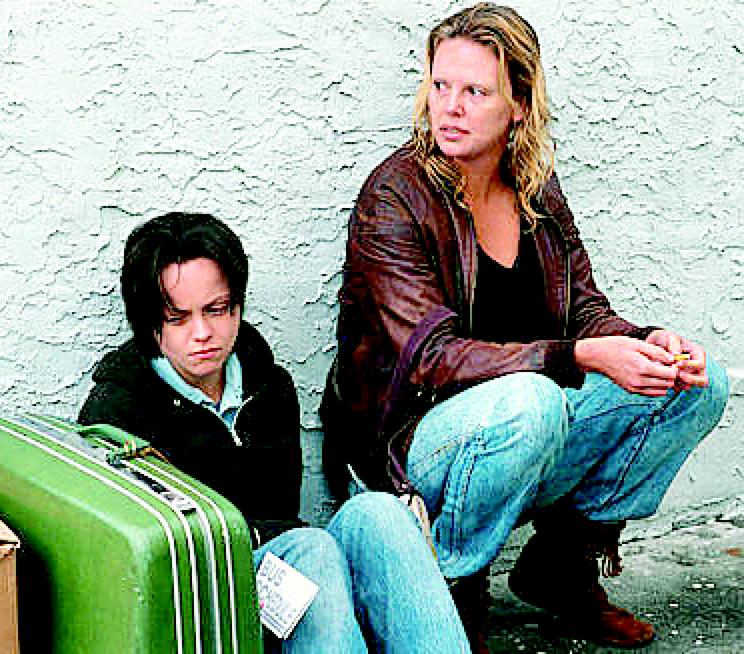The general public can be forgiven as well for steering clear of these dark treasures and sending such fluffy fare as You Got Served and 50 First Dates to the top of the box office charts. … Well, no they can't. But it's understandable.
Monster, the film that has landed star Charlize Theron a well-deserved Best Actress nomination, is certainly one of the darkest of the lot. The true story (depending on your perspective) of female serial killer Eileen Wournos may not make for the lightest of movie-going entertainment, but it is an exceptional piece of cinema and a rewarding experience for the brave of heart.
The film is riveting in the way a well-crafted horror movie or a roadside accident is. It literally freezes you to the spot. Eyes half covered, you stare—not wanting to look, but unable to turn away. Monster exposes us to some ugly truths, but these truths are part of the world we live in, and it's probably better to understand them than to pretend they don't exist.
Theron's brave, gritty performance is certainly the central reason to see Monster. A former model who's had little opportunity to show off her skills (The Italian Job, The Legend of Bagger Vance, Reindeer Games and The Devil's Advocate didn't ask much of her), Theron takes the role of Eileen Wournos by the teeth and shakes it like a predator. Put simply: She acts the hell out of this role.
The film, written and directed by first-timer Patty Jenkins, is fairly straightforward—a linear, fact-based, character-driven crime story that unfolds a bit like the average Lifetime Network movie. The devil is in the details, however, and Monster is rich in those.
The story follows “Lee” from her first fateful meeting with shy, confused, would-be lesbian Selby (delicately limned by Christina Ricci) through the couple's awkward courtship to Wournos' infamous Florida-based killings and ultimately into the courtroom, a setting that pitted the lovers against each other.
Some (certainly the victims' families) have expressed concern that the film generates sympathy for Wournos. Well, it does and it doesn't. We do get to see her as a human being (which—crazy, sane, evil, confused, whatever—she was). But the film treads a very precarious line with astonishing skill. Eileen is never portrayed as a saint. Theron, covered in frightening make-up and thirty extra pounds, plays her as an abrasive, unpleasant, unapologetic streetwalker who probably didn't have many good breaks in life, but has no one to blame but herself for her situation.
Initially, the film supports Wournos' claim about the killings—that they were perpetrated in self-defense. It's easy to claim self-defense once or even twice, but once you've racked up half a dozen bodies, it's pretty hard to claim the moral high ground. Eileen's first killing in the film is unquestionably in self-defense. The subsequent deaths become increasingly hard to support. Wournos comes up with excuses for each one, but the reasoning becomes weaker and weaker each time. By the time Wournos commits her final, soul-shattering killing, it's impossible for audiences (and for Wournos) to believe that any of this is justified.
Ricci matches Theron well with a character that is—if anything—more complex than Wournos. The mousy little Selby, saddled with a broken arm, a poor sense of sexual identity and pinning her hopes on an obviously troubled soul, slowly comes into her own over the course of the film. The couple's final scene together (conducted over the phone) is an emotionally crushing one.
Jenkins does an extraordinarily confident job here, pulling bravura performances from her stars and directing scenes of shocking brutality and subtle symbolism with equal skill. Sequences, like the one in which Wournos and Selby hook up at a local roller rink to the strains of Journey, hint at a level of understated irony that sensitive viewers too busy covering their eyes might miss. I suggest you keep you pupils peeled for this one.



